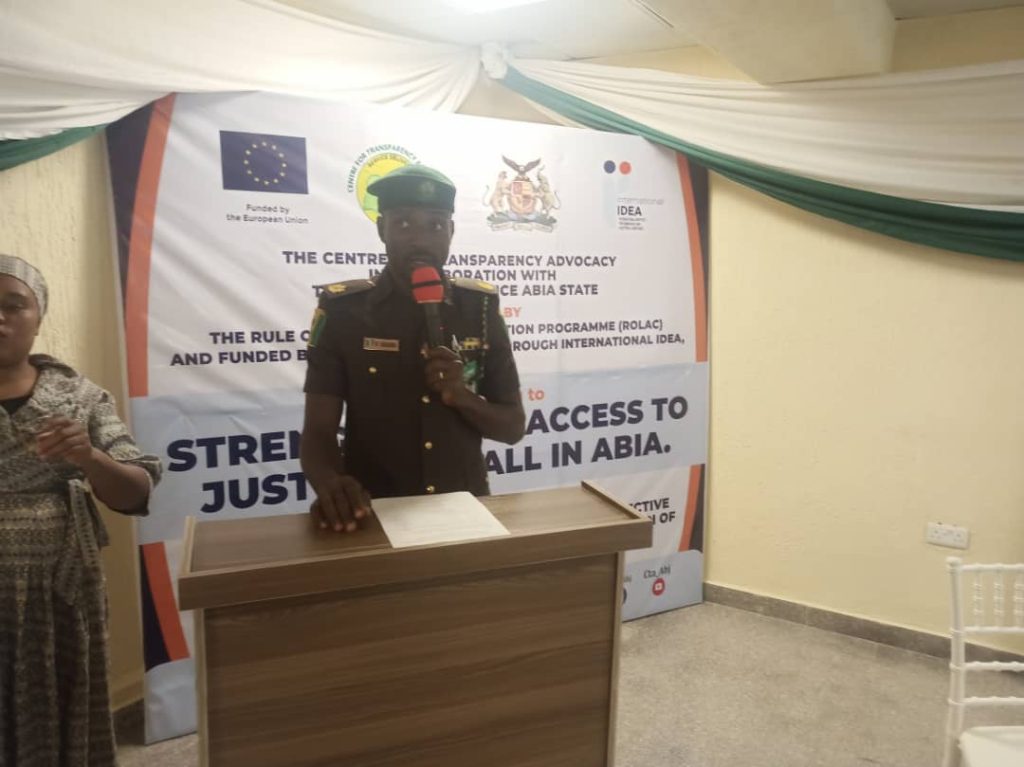…As stakeholders brainstorm on criminal justice administration in Abia
Ngozi Obiachu, Umuahia
The Nigerian Correctional Service, NSC, Abia State command, has appealed for more operational vehicles to convey inmates to court.
Superintendent of Corrections, SC Fredrick Chukwu, who made the plea while speaking at a stakeholders’ meeting on the Administration of Abia State Criminal Justice Law ACJL, in Umuahia, said the service had inadequate operational vehicles.
According to him, the inadequacy of operational vehicles hampers the operations of the service especially in conveying inmates to courts.
SC Chukwu who is in charge of records, Umuahia Correctional Centre, said that only four of the operational vehicles of the service “are functional.”
“We need assistance for mobility. We have 54 courts in Abia and we have seven operational vehicles, and only four are functional. So, we need more operational vehicles to produce inmates in court when needed,” he said.
The high-level stakeholders’ meeting on the ACJL was organised by the Centre for Transparency Advocacy, CTA, supported by the Rule of Law and Anti-Corruption Programme RoLAC, and funded by the European Union.
Responding to a question on why the service seized wheelchairs of a person with disability, PWD, Chukwu said it was to prevent inmates using it as a weapon during any fight.
He explained that contrary to misinterpretations, PWDs are accorded special attention at correctional facilities.
“We don’t allow the use of metallic objects in the cell because in the case of confrontation among inmates, and one uses wheelchair or clutches to hit another inmate, before you know it, an inquest will be sent to us, and we start answering questions.
“However, we don’t leave Persons With Disabilities in our custody without assistance. In fact, PWDs and women in our custodial centres receive special attention. We try as much as possible to offer the needed assistance to PWDs and the vulnerable.”
He commended CTA for the meeting which he noted, would help facilitate speedy dispensation of justice and decongestion of the correctional centres.
Speaking at the event, the Chief Justice of Abia State, Justice Lilian Agbai, represented by justice A.U kalu, thanked Rolac and the European Union for organising the programme to educate the citizens on their rights.
In a remark, the Permanent Secretary, Ministry of Justice, Mrs Chibuzo Ehiemere, expressed happiness over the gathering and thanked RoLAC for organising the event aimed at getting citizens to know their rights.
She also thanked CTA for bringing critical stakeholders together to brainstorm on the way forward in criminal justice administration system of the state.
“The administration of criminal justice law is the law that cannot be implemented without the critical stakeholders,” she stated.
The Permanent Secretary also called for collaboration among the critical stakeholders, arguing that “ACJL cannot be implemented without corroboration by relevant stakeholders.
While appealing for inter-agency collaboration, she called on all stakeholders to collaborate to make sure that the ACLJ is implemented in the state.
Appealing to security agencies to comply with the provisions of the ACJL, the Permanent Secretary, emphasised that confessional statements could only be extracted if the suspect recorded in a video.
A representative of the Civil Society Organisation, Dr Sunny Ibeneme, pointed out that “no society can thrive without justice, equity and fairness.”
He said that the judiciary was not only the last hope of the common man, but everyone.
He also thanked the organisers for working to enlighten the citizens on their rights.
Another participants, Lady Chinyere Frank Ibe, who is the Deputy President of National Council for Women Societies Abia State chapter, also thanked the organisers and called on the participants to help to enlighten the women on their rights as citizens.
In her address, CTA Executive Director, Faith Nwadishi, emphasised the need for more humane and right-centrerd approach to criminal justice, and ultimately improve citizens’ trust in the administration of criminal justice processes and institutions.
She said that “efficient and equitable administration of criminal justice is central to upholding fundamental human rights and ensuring that the justice system is responsive to the needs of the people it serves.”
Participants were drawn from security agencies, judicial officers, civil society groups, traditional institution, among others.

